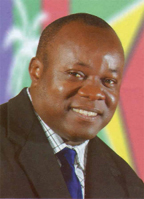-says motion ‘before its time’
The government last evening vetoed a motion to have Parliamentary sittings broadcast live and unedited locally, saying that the motion had come to the National Assembly “before its time.”
The motion, which was in the name of PNCR-1G MP Aubrey Norton, was seeking to have the sittings of the National Assembly broadcast live and unedited by the National Communication Network (NCN) within the period of one month, had the motion been adopted.
According to Norton, such a motion was necessary since the decisions made in Parliament affected the lives of all citizens and consequently they should be given the opportunity to see and hear what happens in Parliament. He argued that broadcasting the proceedings would help in educating the populace – allowing citizens to familiarize themselves with Parliamentary procedures. This, he said, may cause some to develop an interest in politics. He also argued that broadcasting proceedings would better allow the population to determine who in the Parliament had their best interests at heart, and would give views access to unbiased reporting of Parliament.

Further, Norton said that other countries in the Caribbean have taken to televising live the proceedings of the National Assembly and identified Barbados and Bermuda as examples. He also said that in Jamaica, while the proceedings are not broadcast live, the full speeches of prominent members of the National Assembly are later shown on television.
He further stated that should the motion be made law, it would force MPs to take the Parliamentary sittings much more seriously. Norton argued that currently the National Communications Network (NCN) is the station with the widest coverage in the country and is the one in the best state to broadcast the proceedings live. Funding should not be a problem, Norton argued, since the government should see this initiative as a social service to the community.
However, PPP/C MP Gail Teixeira said that contrary to the image Norton was creating, the practice of broadcasting Parliamentary sittings live and unedited internationally was not the norm. She said that based on a survey conducted among Commonwealth countries only a few states legally require stations to broadcast the Parliamentary sessions. She identified states such as Australia, Canada, New Zealand, Samoa and the United Kingdom, as ones which have adopted this practice. She, however, pointed out that often these broadcasts are not live and that they suffer from low viewership.
Further, the Teixeira asserted that in these states the funding was not such a problem and it was the private sector which bore most of these expenses rather than the state.
She added that recently Trinidad & Tobago had decided to broadcast their Parliamentary proceedings using free-to-air technology, which cost the government of the country approximately TT$16M. She said that it would cost the government approximately $600M to implement the same measures Trinidad had done, which it cannot afford at this point.
She also asserted that the general public already has access to information through coverage in the local press and through the Parliamentary website, which she said was in the process of being improved. She also said that the motion was anticipatory since the Parliamentary Management Committee was doing some work in this direction.
Meanwhile PPP/C MP Clement Rohee said that the motion as it was presented had “several flaws” and was “badly conceived”. He suggested that the bill was politically motivated in which the main Opposition was trying to embarrass the government-by suggesting to the populace that he government did not want he public to see what was occurring in the National Assembly. He said that if persons wanted to view the proceedings of Parliament live, the public gallery was available to them. Rohee stated that the motion was “partisan and biased” and stated that the only way the government would approve such a motion was if it was bi-partisan in nature.
AFC MP Sheila Holder supported the motion saying that it would contribute to the continuous national building of the society. She said that such programming would appeal to those in the public who had an interest in politics.
In response to the arguments raised by the government, Norton said that the government was missing the entire point of the motion – which was to have unbiased coverage of the National Assembly to be seen by as large a section of the population as possible.
He said that knowing the nature of the government they would not support a private media house broadcasting the sittings of the National Assembly live, given its history of dealing with private media houses. He said that among some quarters it is suggested that it was the government’s decision to withdraw advertisements from the privately-owned Stabroek News that accelerated the death of the newspaper’s founder David de Caires. PPP/C MP Gail Teixeira objected to this saying that such a statement was a direct infringement of one of the standing orders of the National Assembly.
Further, Norton said that the motion was not anticipatory since he was unaware that such a move was on the agenda of the Parliamentary Management Committee.
Norton, however, said that if the government were to draft a similar motion with the same agenda in the future, it would have the support of the Opposition.
PPP/C MP Donald Ramotar and PNCR-1G MP Mervyn Williams were the other members of the National Assembly who debated this motion.
